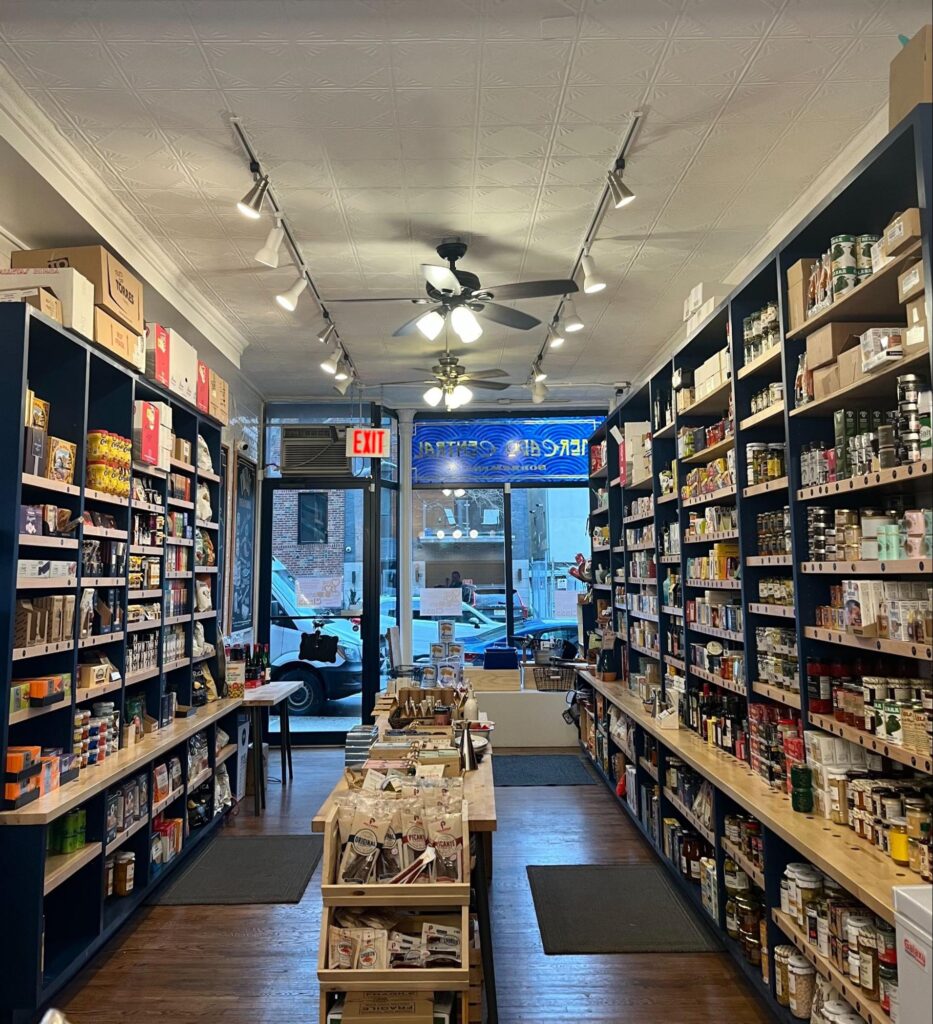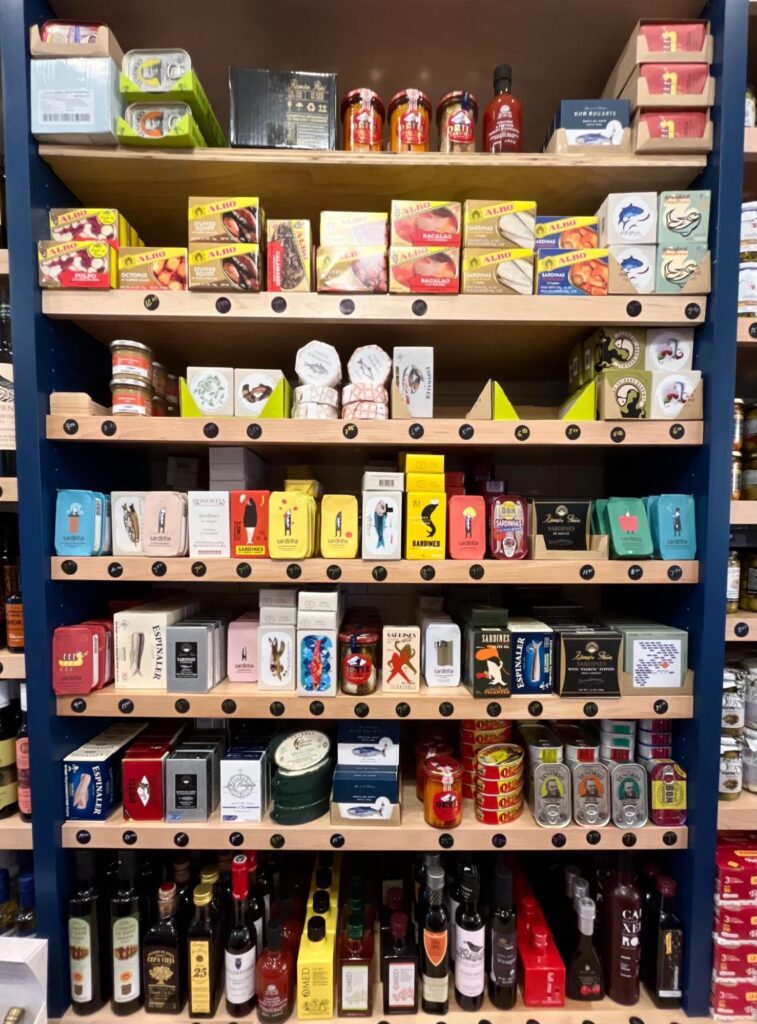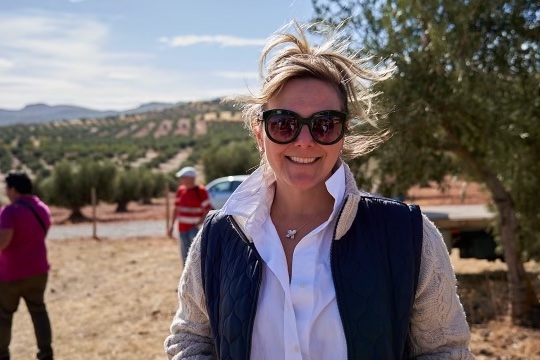The walls of Mercado Central, on the corner of Smith and Degraw in Carroll Gardens, feel more like a museum than a specialty food store. Tins of octopus, mussels, razor clams, sardines and smoked salmon flaunt their colorful facades next to a vast and intricately curated array of olive oils. Despite being the size of a small studio apartment, there still manages to be space for cookbooks, candles disguised as tinned fish, handmade olive wood mixing bowls, and a miniature box grater that can fit in the palm of your hand. And then there’s the vast wall of potato chips in flavors from jamón Ibérico to foie gras to fried egg. Behind the register, near the refrigerator stocked with the real jamón, plus Spanish soda and manchego cheese, is Zhana Londoner, the owner of this little slice of Spain in Brooklyn. A native New Yorker, she’s right at home here, but her path to owning Mercado Central was anything but conventional.
Tell me a bit about yourself and Mercado Central.

Photo: Alice Gilbert/Brooklyn Eagle
I spent all of my life in the entertainment business. I went to school for acting and started my career in theater and television for the most part and then moved into production. I spent a lot of years as a talent manager before my husband, Marco, and I decided to open up our own film and television production and finance company called Momentary Pictures, which we use both as a loan-out as well as a development and financing company for independent film.
We bought a home in Barcelona eight years ago and during Covid, when we were unable to go to Barcelona, we really missed having all the stuff in the pantry that we would typically smuggle back with us.. In our neighborhood, which is wonderful and definitely Italian food-heavy, with some French representation and an awesome Japanese market, there was no Spanish representation whatsoever. Marco and I looked at each other, while our industry was shut down, and said, “Let’s open a Spanish market.” We did not know that we would be the only Spanish market in all of Brooklyn. Ultimately, it’s been this wonderful experience for us, as we’ve entered a completely new industry (Marco has also spent his whole life in show business), and seen how our skillsets translate immediately, which we never really anticipated.
Here we are now, two years later. It’s been a wonderful way to further ingratiate ourselves into the neighborhood that we’ve already lived in for 15 years. Both of us are native New Yorkers – Marco is a 12th generation New Yorker – and we love being small businesses owners here. We have a direct and immediate effect and influence, making sure that the products that we sell are very much something that our demographic and the population in the Carroll Gardens/Cobble Hill areaare interested in.
How did you originally get drawn to Spain and to Spanish food?
To be honest, it’s a rather romantic story. The first time we took our kids to Europe, we took them to Spain, and we spent two weeks traveling through the north of Spain. Our first stop was Barcelona, and we drove up to the Costa Brava. I had been to Spain before, but I had never been to the Costa Brava, and I had never been to Spain with my husband. I felt so deeply connected to the Mediterranean and I looked at Marco, and I told him, “I know I’m Eastern European, but there’s something in me that feels like the tadpoles of whatever became my lineage came out of here. When I die, I want to be brought back here. I want you to cremate me and throw me into this ocean.” It was this incredibly dramatic, probably melodramatic moment, but I just felt a very deep connection.
Sure enough, when we came home, in an illusion of passion and grandeur, Marco said, “I’m going to get you a place on the Mediterranean.” We realized that doing something in the Costa Brava was probably too seasonal and not realistic. Barcelona is a city that’s close to our hearts; it’s artistic, bohemian, incredibly food-focused, and there’s a real similarity between New Yorkers and Catalans. Catalonia historically has always been a merchant city. There’s always been people from all over the world coming and going in Barcelona, so it’s really multicultural, even though they’re super proud of their Catalan heritage. Now, we feel very connected to the culture and have lots of friends in Spain, and we’ve really adapted that lifestyle. The lifestyle is pretty easy to adapt to. I’m not going to lie.
Mercado Central is all about the concept of sobremesa — what does this mean and how do you put it into practice?
Sobremesa refers to the time, during but mostly after a meal, when you’re still around the table, and you’re having this wonderful conversation, and everybody’s having an extra glass, an extra bite, and you’re looking at the people sitting at the table and you’re feeling the feeling of deep connection and love. We like to say that we want to help you to travel through your senses to get you to a wonderful sobremesa. As much as we love our products, and as much as we love Spain, it’s really about helping everyone here communicate and connect again.
How did your film and entertainment skills translate into the food industry?
I was very much surprised by this! We have no experience in retail whatsoever. We did have some experience in food – I worked in restaurants during college. Marco and I met on a series called “The Restaurant” – which is also a little fun fact. I was really surprised when we first opened and the first few people who started walking in here, and it still happens to this day, would say to me, “I feel…” whether that’s “I feel like I’m back in Barcelona”, or “I feel like I’m on vacation in Spain.”
I’ve had Spaniards cry because they haven’t seen that many true Spanish products in the United States, or they see ColaCao, which is what every Spanish person has throughout their childhood. When they see something like ColaCao, they’re moved because it reminds them of home. To me, that feels like a story has been told, and my whole life, I’ve been a storyteller. It doesn’t matter what side I’m on, whether I’m on stage or in front of a camera, or whether I’m helping another performer reach their goals or producing a movie and developing a script, it’s all about storytelling. When somebody walks into the store and says, “I feel like…” it goes back to why people become artists, and it’s our core, human need to communicate and connect.
Food is another avenue to do that. It’s not surprising that you find a lot of people from entertainment in the food business. They’re so similar and eccentric personalities. You have to be willing to work long and hard hours. And what I like, especially in the times that we’re in now, is that when we’re eating, we don’t have to talk about anything else. It can be purely about the sensorial experience that we’re both sharing. We don’t have to discuss politics; we can just say, “Isn’t this delicious?” I love that it gives us something that we can all grab onto and mutually reconnect with.
Every single one of these products that we sell has a story. The other thing that I like to say is “I don’t want you to have six degrees of separation between you and the producers of your food. I want you to have one degree of separation.” If you come to one of our classes, you’ll have an immediate connection to the people. We bring in our cheesemakers, our olive oil producers. We go to the olive groves, to the farms; we spend time with the families who have been doing this for 50, 150 years. Every brand has a story. When you know that story, you can actually see the personalities of those producers manifest themselves within the product.
The first time I had that revelation, I went to the olive grove of Casa de Hualdo, outside of Toledo. They sell one of my favorite olive oils, and they make one of the best manchego cheeses ever. I remember meeting them for the first time, before we went to the farm, and thinking, “Oh wow, these people, their passion, their personalities, are something that I felt without ever having met them before. ” We use the term ‘branding’ in this very commercial and flippant way, where everybody is branding themselves or branding this or that. When you actually see it manifest from the producers onto a label, into the bottle, it really takes on a whole different meaning.
What is the neighborhood’s influence on the store?
Carroll Gardens is just an amazing place, but obviously we’re biased since we live here. Our customers range from the Spanish abuelitas, the little grannies, from the large Galician community here in Cobble Hill/Carroll Gardens. It’s been here since the ‘50s and ‘60s, when Galicia was extremely poor, and they were all seamen, so they came and started working on the docks. So, we do have a Spanish community here, of which people are not really aware.. Those folks come in for their staple items.
The majority of our clients are chefs and people who work in media and entertainment. They’re well-educated, well-traveled people who are interested in food, in learning (our classes are very popular), because people love learning in a social setting and meeting their neighbors. Friendships develop out of every event we’ve ever had at the store. I have personal chefs who come here weekly because they have clients who love certain products of ours. We have food writers who come in, magazine editors and newspaper editors. It’s awesome because you’re always engaged in an interesting conversation and people are always interested in learning something new, finding a new product and just chatting.
Getting to teach people about the products is wonderful, but when you get someone who has spent a semester studying in Spain or used to go to Spain with their family every summer, this is like a homecoming of sorts.
What are your top-selling items?
Our jamón Ibérico is definitely a top seller. Our olive oil is, too, and we focus on making sure everything is 100% pure and single estate, etc. Andwe do have the largest selection of tinned fish in New York City, so tinned fish has always been one of our focuses and one of our top-selling items. So, those three things are probably our best sellers, along with potato chips, of course.
Valentine’s Day is obviously coming up next week. I don’t know how Spaniards feel about this holiday, but I do know that their general culture is pretty romantic. Tell me about your plans for Valentine’s Day.

Photo: Alice Gilbert/Brooklyn
We like to have an event every Valentine’s Day. Last year, the event was titled “Give a Fishy to your Squishy,” and it was a tinned fish date night. This year, our event is all about Catalan olive oil and chocolate. We will have Dr. Tassos Kyriakides from Yale come and teach us about the health benefits of olive oils, while we teach you how to taste it. We also have Ursula XVII, an amazing Catalan-American chocolatier from the North Fork, who’s going to be teaching us to make some chocolate bonbons.
At all of our events, we always feature a natural wine, so we’re going to be serving some Catalan natural wines, and we always have lots of tapas. So, that’s what we’re doing on Valentine’s Day because it’s boring to go out to eat at the restaurant you visit every weekend anyway, so might as well do something different, educate yourself a little bit.
This event is being endorsed by the Catalan government. We are now working with the delegation of Cataluña to the US and Canada, and we are going to be working with them on their events here in NYC and in DC. In fact, the following event that they will be sponsoring is sort of the Catalan Valentine’s Day, called Sant Jordi. Sant Jordi is the patron Saint of Cataluña, and they have this amazing festival where the tradition is to bring your friends and loved ones a rose and a book. So, we will be doing something else on April 18, sponsored by the Catalan government, but this is the first leg of that.
Sounds like a great time! What are Mercado Central’s plans for the future?
We will be expanding into the Gowanus neighborhood with our second location, which will be half specialty shop, as we have now, and half pintxo bar. So, you can come to the counter and get a copa, which is a small glass of wine, or a caña, which is a small beer, and how Spaniards classically drink all over Spain, and a little pintxo or a tapa. This is where you’re going between your lunch meetings or before you go to dinner. to grab a drink with a friend. This is not a dinner hangout. It’s that counter culture (by counter, I mean a lunch counter) where you come in and you touch base with your neighbors.
It’s another way to expand our community outreach and we’ll be doing even more events and classes there since it’s a larger space. So, hopefully you’ll be seeing location #2 sometime in the summer. We could not be more excited.
